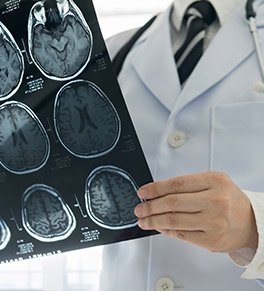
Seizures
Seizures are caused by epilepsy or triggered by external factors like head injuries, drug use or other events. We'll make sure you get optimal treatment.
We take an evidence-based yet holistic approach when treating this highly complex condition.
Seizure symptoms
A seizure is a brief disruption in brain function caused by abnormal, excessive activity in your nerve cells. Epilepsy causes excessive electrical activity. Seizures can present a variety of different symptoms including:
- Staring blankly or lack of responsiveness
- Uncontrolled twitching or jerking
- Stiffening of the body
- Sudden loss of consciousness
- Unusual sensations like abnormal tastes or smells
- Sudden, unexplained mood changes like fear, anxiety, panic or laughter
- Drooling, frothing at the mouth
- Tongue or cheek biting
- Loss of bladder control
Your symptoms will depend on the type of seizure and which area of the brain is involved.
When to seek care for a seizure
Seizures can happen at any age. If you have any seizure symptoms, visit your doctor, the emergency room or our Epilepsy Care program.

We'll identify and treat the true cause of your seizures
Seizure conditions are neurologically complex, impacting your physiology, and emotional and mental states. Let our specially trained experts and leading edge tools give you relief.
Call 714-456-6203 now to speak with a seizure specialist, or
Why choose UCI Health for seizure care?
Our level 4 designation from the National Association of Epilepsy Centers, the highest distinction possible, ensures superb care
This recognition reflects our excellence in diagnosing and treating complex epilepsy cases, ensuring you receive the most comprehensive care available.
We offer innovative treatment option
Our leading-edge therapies include Responsive Neurostimulation (RNS), Vagus Nerve Stimulation (VNS), and Deep Brain Stimulation (DBS). Advanced treatments help control seizures and improve quality of life if you have drug-resistant epilepsy. Our minimally invasive surgical options reduce your hospital stay and recovery time.
You may participate in our clinical trials
UCI Health offers clinical trials that give you access to the latest, most innovative therapies for epilepsy and seizures. This gives you an opportunity to explore new treatment options that may not be available elsewhere.
Comprehensive multidisciplinary team
Our care team includes top specialists in seizures, epilepsy, neurosurgery and neuropsychology. We work together to provide you with the right path forward.
Outstanding patient satisfaction
UCI Health is consistently recognized for high patient satisfaction. Our dedicated team focuses on providing compassionate care, ensuring an exceptional experience throughout every step of your treatment journey.

Find a neurology clinical trial
Talk to your doctor to see if a neurology clinical trial is right for you.
Featured Blog Posts

UCI Health epilepsy program delivers what others can't

Patient proves it’s never too late for epilepsy surgery

Surgery cures an artist's seizures
Diagnosed with a treatment-resistant seizure disorder, Alan Powell thought his artistic life was over. But UCI Health epilepsy specialists were determined to halt his convulsions and restore his creativity.
Types of seizures
Seizures are typically categorized into focal and generalized types.
Focal seizures
Focal seizures (previously called partial or petit mal seizures) are caused by abnormal electrical activity affecting one area of the brain. Focal seizure symptoms may include:
- Uncontrolled movements in one part of the body (e.g. arm or face)
- Nausea or abdominal discomfort
- Odd smells or tastes
Consciousness may stay intact or the seizure can lead to loss of awareness. The most common type of focal epilepsy is temporal lobe epilepsy. Sometimes, focal seizures can also spread to involve the entire brain and lead to a secondary tonic-clonic seizure.
Generalized seizures
A generalized seizure is caused by electrical activity that affects the entire brain.
The most common type of generalized seizure is a tonic-clonic seizure (previously called grand mal seizure). It results in sudden loss of consciousness with stiffening and jerking of the entire body, often followed by confusion or fatigue.
Other types of generalized seizures include tonic seizures, clonic seizures, myoclonic seizures, and atonic seizures.
Causes of seizures
A variety of factors cause seizures. We call seizures provoked when they’re triggered by factors like head injury, infection, drugs or metabolic disturbances. Seizures can also be unprovoked, which typically means there’s an underlying neurological condition like epilepsy.
Our approach to seizure diagnosis
Epileptic and other types of seizures are some of the most complicated conditions in neurology. At UCI Health, we offer the highest possible level of care, including advanced diagnostic tools and treatments. Our Epilepsy Care program has earned a Level 4 designation from the National Association of Epilepsy Centers.
How we approach your diagnosis
To help identify the cause of seizures, we use:
- Routine EEG monitoring: Evaluates brain activity and detects abnormal electrical patterns linked to seizures.
- Ambulatory EEG: We use a portable EEG to monitor brain activity over an extended period while you go about your daily activities.
- Video EEG monitoring: Captures and analyzes brain activity during a seizure.
- Advanced brain imaging: MRI and CT scans identify structural abnormalities.
- Genetic testing: Uncovers inherited conditions contributing to epilepsy.
What to do if you have symptoms
If you're experiencing seizures but aren't sure whether it's epilepsy, it's important to get a clear diagnosis.
See a doctor if you're having unexplained episodes such as sudden loss of consciousness, unusual movements, or confusion. Keep a record of your symptoms—note when and how they occur, and any triggers you notice.
Early diagnosis is essential for effective treatment.
Seizure treatment at UCI Health
At UCI Health, our Comprehensive Epilepsy Program provides advanced, personalized care for all types of seizures. We offer you a full spectrum of treatments, including medical therapies, surgical options, and participation in leading-edge clinical trials.
Seizure and epilepsy treatment at UCI Health
We begin with a comprehensive evaluation. That includes routine and ambulatory EEG, video EEG, and brain imaging to understand the type and source of your seizure. We also offer specialized care for women with epilepsy, a condition that involves hormonal triggers.Our personalized treatment plan includes medication management. We prescribe the latest anti-seizure medications tailored to your condition.
Advanced treatment options
In cases where medication doesn’t control your seizures, we offer surgical options like lobectomy, laser ablation, and neuromodulation therapy.
- Epilepsy surgery - Laser ablation and lobectomy removes or reduces the seizure activity in your brain.
- Responsive Neurostimulation (RNS) - RNS provides real-time seizure detection and intervention if your condition is especially difficult to manage.
- Vagus Nerve Stimulation (VNS) - This non-invasive treatment for drug-resistant epilepsy offers seizure control through electrical stimulation of the vagus nerve.
- Deep Brain Stimulation (DBS) - DBS is a highly effective treatment that involves implanting a device to stimulate specific brain areas. It helps to control your seizures when other therapies are not effective.
- Catamenial epilepsy treatment - We offer customized management strategies for women with seizure patterns linked to hormonal changes.
- Clinical Trials - UCI Health provides access to clinical trials for new treatments, allowing patients to explore the latest in seizure management.
The benefit of these treatments
We’re dedicated to improving the overall quality of your life. You receive continuous, multidisciplinary support as we focus on optimizing seizure control.
Your doctors can refer you to our epilepsy program or you can call to make an appointment.




